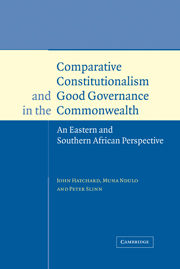 Comparative Constitutionalism and Good Governance in the Commonwealth
Comparative Constitutionalism and Good Governance in the Commonwealth Book contents
- Frontmatter
- Contents
- Preface
- List of cases
- List of constitutions
- List of statutes
- List of other instruments
- Map
- Introduction
- 1 The democratic state in Africa: setting the scene
- 2 Constitutions and the search for a viable political order
- 3 Devising popular and durable national constitutions: the new constitutions of the 1990s
- 4 Perfecting imperfections: amending a constitution
- 5 Presidentialism and restraints upon executive power
- 6 Enhancing access to the political system
- 7 Making legislatures effective
- 8 The judiciary and the protection of constitutional rights
- 9 The devolution of power to local communities
- 10 Developing autochthonous oversight bodies: human rights commissions and offices of the ombudsman
- 11 Seeking constitutional control of the military
- 12 Constitutionalism and emergency powers
- 13 Constitutional governance: the lessons from southern and eastern experience
- Bibliography
- Index
4 - Perfecting imperfections: amending a constitution
Published online by Cambridge University Press: 23 June 2009
- Frontmatter
- Contents
- Preface
- List of cases
- List of constitutions
- List of statutes
- List of other instruments
- Map
- Introduction
- 1 The democratic state in Africa: setting the scene
- 2 Constitutions and the search for a viable political order
- 3 Devising popular and durable national constitutions: the new constitutions of the 1990s
- 4 Perfecting imperfections: amending a constitution
- 5 Presidentialism and restraints upon executive power
- 6 Enhancing access to the political system
- 7 Making legislatures effective
- 8 The judiciary and the protection of constitutional rights
- 9 The devolution of power to local communities
- 10 Developing autochthonous oversight bodies: human rights commissions and offices of the ombudsman
- 11 Seeking constitutional control of the military
- 12 Constitutionalism and emergency powers
- 13 Constitutional governance: the lessons from southern and eastern experience
- Bibliography
- Index
Summary
Safeguarding a constitution against retrogressive amendments is of paramount importance for otherwise:
A constitution, which is to some extent a device for preserving certain states of affairs, might become a device for undermining the very states of affairs it is designed to preserve.
This has led some to argue for an unamendable constitution. Attractive as it may appear at first sight, it overlooks the crucial fact that however rigorous the procedure for its making, a constitution may still contain imperfections or become outdated. As George Washington himself noted in 1787: ‘The warmest friends and the best supporters the [United States] Constitution has do not contend that it is free from imperfections; but they found them unavoidable and are sensible that if evil is likely to arise there from, the remedy must come hereafter.’ Further, as Justice Khanna of the Indian Supreme Court has noted, no generation has a monopoly on knowledge that entitles it to bind future generations irreversibly, and a constitution that denies people the right of amendment invites attempts at extra-legal revolutionary change. In short, ‘a constitution that will not bend will break’.
Further we must not forget that an unscrupulous executive may seek to make a constitution unamendable for its own political ends. For example, the Constitution of Ghana 1979 came into effect following the handover of power by the Armed Forces Revolutionary Council to a civilian government.
- Type
- Chapter
- Information
- Comparative Constitutionalism and Good Governance in the CommonwealthAn Eastern and Southern African Perspective, pp. 43 - 56Publisher: Cambridge University PressPrint publication year: 2004


